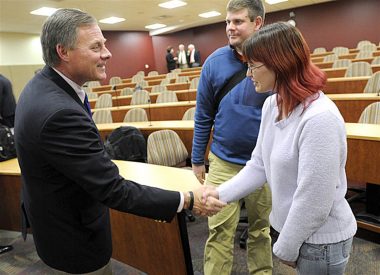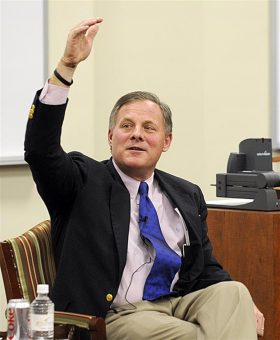U.S. Senator Richard Burr (R-NC) told students at Elon University School of Law that the economic, educational and civic health of their respective communities depends on the contributions they are willing to make as citizens and future lawyers to improve the lives of others. Burr visited the law school Feb. 16 for sessions with the students and friends of Elon Law.
“It really does require our participation, our commitment, to effect positive change in the lives of others, people you may never have the opportunity to meet,” said Burr. “Don’t wait for Washington. Don’t wait for Raleigh. Take the responsibility within your community to fulfill that part that you can affect. Do that and it is amazing how smoothly everything will work.”
Burr, who was sworn in to the U.S. Senate in 2005, has served in Congress since 1995 when he was first elected to the U.S. House of Representatives. He currently serves as the Ranking Member of the Senate Veterans Affairs Committee and on the Select Committee on Intelligence, the Health, Education, Labor, and Pensions Committee, and the Energy and Natural Resources Committee.
During his presentation to Elon Law students, Burr focused on the importance of improving the nation’s high school graduation rate and exercising restraint in federal spending.
Noting that high schools across the nation only graduate 70 percent of students on time, Burr said, “If this were a health disease, we would call it an epidemic and we would do whatever we had to do to solve it, but because it is education, we buy off on the idea that ‘some kids learn and some kids don’t.’ That is fine if you only want 70 percent to succeed, but if you want 100 percent to have the opportunity at success then you have got to provide a different solution.”

Burr said that he believes school systems across the country would respond creatively and successfully to a national drive to improve the nation’s graduation rate. “I am less concerned with whether students are on track with everyone else in math and science in fifth grade and eighth grade, and I am more concerned that they have the capacity to learn and that they are making adequate progress from the start of the year to the end of the year, and you can’t pick that up in test scores because every child is different,” Burr said.
With regard to the economic condition of the country, Burr cautioned against expansive increases in federal spending, noting that the federal government currently holds $11 trillion in debt with an estimated annual interest payment on that debt of $500 billion in 2009.
“I have the same high hopes that the President does, that we are going to tackle health care reform, that we are actually going to fix K through 12 education, that an energy plan for this country is not only smart, it is essential that we get in place,” Burr said. “But the question I have to ask as we look at it all this is where are we going to get the money. It is my hope that people will look back at the second half of the ’90s and remember that it is a balance of restrained spending and a tax structure that makes sense and is fair. Without this, we will be on a spiraling down that is irreversible at some point.”
While at Elon Law school, Senator Burr also led an informal discussion with practicing attorneys from the Triad region, hosted by Elon University President Leo M. Lambert, to discuss issues before the 111th Congress.



